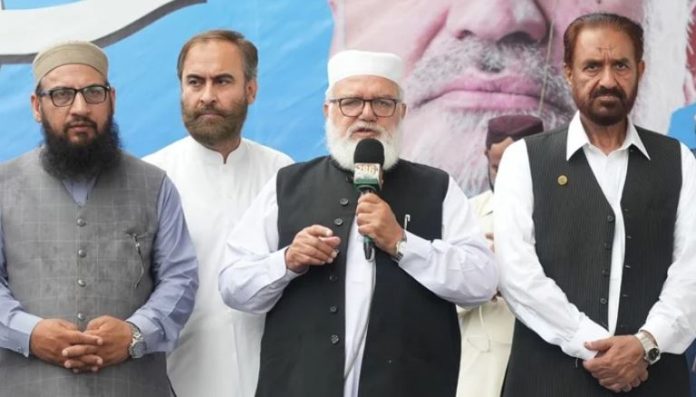Staff Reports
RAWALPINDI: As the Jamaat-e-Islami (JI) sit-in against inflation including a massive hike in power tariffs entered the sixth day, the party’s Vice Emir Liaqat Baloch said Wednesday that the federal government’s technical committee “seeks more time to make progress on the protesters’ demands”.
“The government’s technical team agreed with our demands,” Baloch said while speaking to journalists after holding the second round of talks with the government’s negotiation committee members at Rawalpindi’s commissioner’s office earlier today. The head of the JI’s negotiation team warned that his party would stop negotiations with the government if it showed a nonserious attitude towards the party’s demands including reviewing contracts with the independent power producers (IPPs) blamed for bloated power bills.
“We are told that [Federal Information Minister] Attaullah Tarar is busy in a meeting with the prime minister, therefore, he did not appear here today,” he added.
He further said that the JI was staging the sit-in to resolve the nation’s basic issues.
He added that his party accepted the government’s invitation for dialogue for which the JI emir said that talks and sit-in would continue side-by-side until the fulfilment of the demands.
Elaborating further on the core national issues, Baloch said that the country was going through a political crisis and facing the menace of terrorism but the “people don’t care about these things”.
He demanded the federal government to provide relief to the masses via petroleum products and agriculture.
The development came after the religio-political party’s emir Hafiz Naeemur Rehman a day ago announced extending the ongoing protest being staged on Rawalpindi’s Murree Road and holding countrywide demonstrations to mount pressure on the government to fulfil JI’s demands.
He announced that the party would hold a sit-in in front of Sindh Governor House in the first phase which will be followed by subsequent protests in Lahore and Multan as well on Wednesday.
However, the sit-ins were postponed after Hamas political chief Ismail Haniyeh’s assassination in Tehran, Iran, as the party decided to offer his funeral prayers in absentia.
The politico-religious party has put forward 10 conditions, including renegotiation of agreements with IPPs, for ending its protest sit-in.
The JI’s demands are as follows:
Abolition of Petroleum Development Levy on all petroleum products and withdrawal of latest increase in prices of these products.
20% reduction in prices of food commodities, electricity and gas tariffs.
Renegotiation of agreements with independent power producers (IPPs)
End clause of agreement with IPPs on making payments in US dollars.
50% discount should be granted to power consumers of 500 units
Reduction in taxes on agriculture and industrial sectors besides decreasing their financial burden by 50%
Ensure incentives to industrial sector, trade and investment to provide employment to youth.
Withdrawal of increase in taxes on the salaried class and imposition of taxes on the privileged class.
Cut in non-development expenses by 35%.
Withdrawal of all taxes on stationery and other items used in education and training of children.
The first round of talks was held on Sunday in which a three-member delegation including Federal Minister for Information and Broadcasting Attaullah Tarar, Amir Muqam, and Tariq Fazal Chaudhry met the JI negotiation committee.
Following the meeting, Tarar announced that the government formed a technical committee to review the JI’s demands.
He added that the federal minister for water and power had been added to the technical team, comprising the Power Division secretary and representatives of the finance ministry and the Federal Board of Revenue (FBR), to review the JI’s demands.
The minister added that the JI tabled most of its demands related to electricity issues. He vowed that these issues would be resolved at the earliest.




